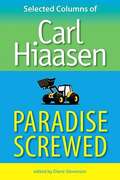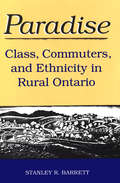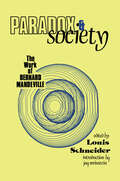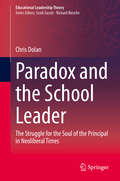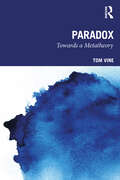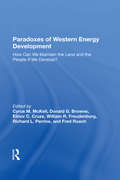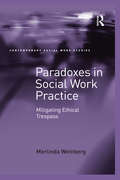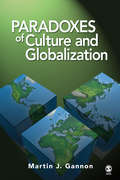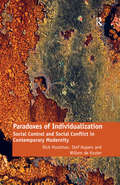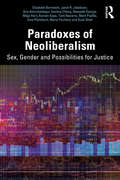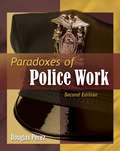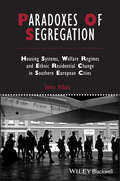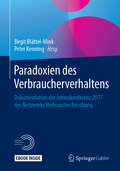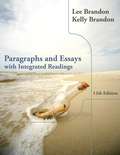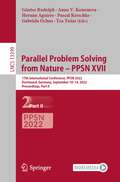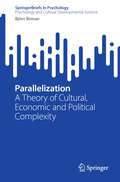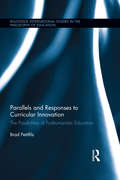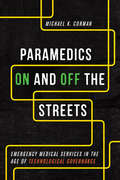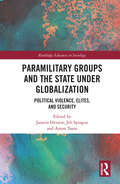- Table View
- List View
Paradise Screwed: Selected Columns of Carl Hiaasen
by Carl Hiaasen Diane StevensonIn this book, Carl Hiaasen writes about politics and politicians, crime and criminals, ordinary people and extraordinary people, and a lot of just plain south Florida weirdness.
Paradise: Class, Commuters, and Ethnicity in Rural Ontario
by Stanley BarrettWhat was life like in the 1950s in small communities in Ontario? Lower-class and upper-class residents might have different memories of those days, but on one thing they would agree: it is a much different world in rural Ontario today. The old guard has lost most of its power, displaced partly by 'big brother' in the form of bureaucracy, and new comers from the city in search of affordable housing--even if it means commuting daily to work. Unlike their British-origin predecessors, the newcomers who have begun to appear in the countryside represent a wide range of ethnic and economic backgrounds.Paradise concentrates on the transformed class system of one community in rural Ontario. In a comparison of the decade following the First World War and the 1980s, Stanley R. Barrett analyses the changing face and structure of a town as it has had to adapt to modern social and economic realities. Particular attention is paid to the phenomenon of the commuter in search of affordable housing and the influx of immigrants of varied ethnic backgrounds, and the interaction between these newcomers and long-term residents. What is striking is just how massive the changes in small-town Ontario have been since the Second World War--to the extent of almost obliterating long-assumed distinctions between rural and urban society.
Paradox and Society: Work of Bernard Mandeville
by Louis SchneiderThe writings of Bernard Mandeville mark an important transition between enlightenment, social philosophy, and modern science. Born in Holland in 1670 and educated as a physician, Mandeville spent the greater part of his working life in England, where he died in 1733. In some respects, Mandeville can be compared to Voltaire - Mandeville's junior by twenty-four years.Mandeville had the knack of making controversies volcanic and of arousing heated debate about any topic on which he chose to comment - and he chose to comment on virtually everything. He was especially1 interested in social evolution, morality and society, prostitution and romantic love, crime and its deterrence, and in social aspects of religion. His views on these and countless other topics cohere in his continual fascination with the consequences of social and economic actions that run counter to anticipations and intentions and in the paradoxical or ironic cast that such outcomes often have. In Paradox and Society, Louis Schneider is the first to offer a full consideration of Mandeville as a sociologist.Schneider offers an intellectual and characterological portrait of Mandeville, examining his writings and reactions to him over time. Schneider goes on to review Mandeville's theory of human nature, and explores his hotly contested notion of the paradox of private vices and public benefits - that the arousal of desires is a necessary precondition for the stimulation of social and economic development.Social action outside the marketplace, and Mandeville's problematic theory of social evolution, are next considered. The volume ends with an examination of paradox, irony, and satire in society. In this detailed analysis of one of the world's most controversial social critics, Schneider shows us that Mandeville offers a vision of human society that is of enduring significance. He challenges the reader to consider how that vision might operate in today's world.
Paradox and the School Leader: The Struggle for the Soul of the Principal in Neoliberal Times (Educational Leadership Theory)
by Chris DolanThis book proposes that paradox, as a theoretically rich and historically enduring concept, has significant potential for researchers in the field of critical leadership studies. By enriching its general form and infusing it with added complexity and theoretical influence, it is argued that paradox can be legitimately applied as a lens for examining and as a pedagogy for realising new learning possibilities.The book takes paradoxes as formed out of the constitutive practices of discourse rather than as representations of conflict or complexity. Using fifteen paradoxes derived from theoretical and empirical analysis, it provides insights into the competing forces that contradict simplistic positivist accounts of contemporary school leadership and reveal the presence of a political struggle for the soul of the principal in the neoliberal era. It considers these paradoxes in three categories: (1) principal subjectivity and authority, (2) neoliberal policy and (3) managerial practice. The book advocates critique, counter-conduct and agonistic thought and practice as resources for principals participating in such a struggle, and employs Foucault's 'care of the self' and 'practices of freedom' to promote more active involvement of principals in authoring their ethical and political selves.
Paradox: Towards a Metatheory
by Tom VineHistory reveals countless attempts by great minds to solve life’s paradoxes. But what if these attempts miss the point? What if paradox is life? Contrary to the supposedly sublime linear logic that underpins our prevalent modes of theoretical and empirical enquiry, in this fascinating book, organizational anthropologist Tom Vine charts the pervasiveness of paradox across the academy: from arithmetic to zoology. In so doing, he reflects on the concept of paradox as a widespread existential ‘pattern’, a pattern which holds significant metatheoretical and pedagogical potential. Paradoxes, he argues, are not inconveniences or ‘fault lines in our common-sense world’ but are coded into our very existence. Paradoxes thus present their own vital logics that shape our lives: they thwart moral and ideological uniformity; they even out subjective experience between ‘the haves’ and ‘the have nots’; and they shed light on the opaque concepts of consciousness and agency. This book will appeal to anybody with a curious mind, particularly scholars and students with an interest in one or more of the following: complexity theory, critical pedagogies, ethnography, nonlinear dynamics, organization theory, and systems theory.
Paradoxes Of Western Energy Development: How Can We Maintain The Land And The People If We Develop?
by Cyrus M Mckell Donald G Browne Elinor C. Cruze William R FreudenburgProposed energy resource development in the arid western United States raises a number of potential problems for an environment that does not have a great deal of resiliency. Projected population increases associated with large-scale development activities may go beyond the capacity of small, isolated rural communities to absorb them; and constraints on western agricultural and industrial development—for example, demands for water already exceeding the supply available—also limit energy development. The authors of this wide-ranging book first evaluate western energy resources, then objectively discuss the consequences of development on the region’s physical and social environments. Among the questions they consider are: Who will reap the economic benefits of development, and who will bear the environmental costs? What will be the effects on the environment? The social structure? The quality of life? Are open spaces a national treasure in their present form, or should they be regarded as space available for development? What are the unique demands of reclamation in the arid west? And, given the recent trend of western states-rights militancy and shifts of population to the southwest, what impact will new federal and state policies have on resource management?
Paradoxes in Social Work Practice: Mitigating Ethical Trespass
by Merlinda WeinbergIn the helping professions, codes of ethics and decision-making models have been the primary vehicles for determining what constitutes ethical practice. These strategies are insufficient since they assume that shared meanings exist and that the contradictory universal principles of codes can be reconciled. Also, these tools do not emphasize the significance of context for ethical practice. This book takes a new critical theoretical approach, which involves exploring how social workers construct what is ’ethical’ in their work, especially when they are positioned at the intersection of multiple paradoxes, including that of two opposing responsibilities in society: namely, to care for others but also to prevent others from harm. The book is built on narratives from actual front-line workers and therefore is more applicable and grounded for practitioners and students, offering many suggestions for sound practice. It illustrates that an understanding of ethics differs from worker to worker and is heavily influenced by context, workers’ values, and what they take up as the primary discourses that frame their perceptions of the profession. While recognizing the oppressive potential of social work, the book is rooted in a perspective that ethical practice can contribute to a more socially just society.
Paradoxes of Culture and Globalization
by Martin J. Gannon"A truly extraordinary book! The range of knowledge revealed by the author is quite astonishing and the material presented is done so in a clear and unambiguous writing style."The book includes astonishingly varied perspectives on issues that will impact the hoped-for positive consequences of globalization. I felt I was being informed by an expert who grasps the complexity of the issues involved in ways that make them clear and useful. If I was teaching a course that had anything to do with globalization and/or culture, I would assign this book—and if I knew of someone who was being assigned to another country, I would require him or her to read this book."—Benjamin Schneider, Valtera Corporation and Professor Emeritus, University of MarylandWhat is a paradox? Why are cross-cultural paradoxes essential for understanding the changes that are occurring because of globalization? Encompassing a wide variety of areas including leadership, cross-cultural negotiations, immigration, religion, economic development, and business strategy, Paradoxes of Culture and Globalization develops cross-cultural paradoxes essential for understanding globalization. Key FeaturesHighlights over 90 paradoxes structured in a question/discussion format to actively engage readers and provide an integrative overview of the bookPresents key issues at a higher and integrative level of analysis to avoid stereotyping particular culturesFacilitates class discussions and the active involvement of class members in the learning process of culture and globalization.Enlarges individuals' conceptual understanding of cross-cultural issues Focuses on both traditional and controversial topics including motivation and leadership across cultures, communicating and negotiating across cultures, immigration, religion, geography, economic development, business strategy, and international human resource managementIntended AudienceThis is an excellent text for advanced undergraduate and graduate courses in International Management, International Business, Comparative Management, World Business Environment, Cross-Cultural Management, Cross-Cultural Communications, and Cultural Anthropology in the departments of business and management, communication, and anthropology.Meet author Martin J. Gannon! www.csusm.edu/mgannonMartin J. Gannon is also the author of the bestselling text Understanding Global Cultures (SAGE, Third Edition, 2004) and Cultural Metaphors: Readings, Research Translations, and Commentary (SAGE, 2000).
Paradoxes of Individualization: Social Control and Social Conflict in Contemporary Modernity
by Dick Houtman Stef Aupers Willem de KosterParadoxes of Individualization addresses one of the most hotly debated issues in contemporary sociology: whether a process of individualization is liberating selves from society so as to make them the authors of their personal biographies. The book adopts a cultural-sociological approach that firmly rejects such a notion of individualization as naïve. The process is instead conceptualized as an increasing social significance of moral notions of individual liberty, personal authenticity and cultural tolerance, which informs two paradoxes. Firstly, chapters about consumer behavior, computer gaming, new age spirituality and right-wing extremism demonstrate that this individualism entails a new, yet often unacknowledged, form of social control. The second paradox, addressed in chapters about religious, cultural and political conflict, is concerned with the fact that it is precisely individualism's increased social significance that has made it morally and politically contested. Paradoxes of Individualization, will therefore be of interest to scholars and students of cultural sociology, cultural anthropology, political science, and cultural, religious and media studies, and particularly to those with interests in social theory, culture, politics and religion.
Paradoxes of Integration: Female Migrants in Europe
by Mirjana Morokvasic-Müller Maria Kontos Floya AnthiasThis timely and innovative book analyses the lives of new female migrants in the EU with a focus on the labour market, domestic work, care work and prostitution in particular. It provides a comparative analysis embracing eleven European countries from Northern (UK, Germany, Sweden, France), Southern (Portugal, Spain, Italy, Greece, Cyprus) and Eastern Europe (Poland, Slovenia), i.e. old and new immigration countries as well as old and new market economies. It maps labour market trends, welfare policies, migration laws, patterns of employment, and the working and social conditions of female migrants in different sectors of the labour market, formal and informal. It is particularly concerned with the strategies women use to counter the disadvantages they face. It analyses the ways in which gender hierarchies are intertwined with other social relations of power, providing a gendered and intersectional perspective, drawing on the biographies of migrant women. The book highlights policy relevant issues and tries to uncover some of the contradictory assumptions relating to integration which it treats as a highly normative and problematic concept. It reframes integration in terms of greater equalisation and democratisation (entailed in the parameters of access, participation and belonging), pointing to its transnational and intersectional dimensions.
Paradoxes of Neoliberalism: Sex, Gender and Possibilities for Justice (Social Justice)
by Janet Jakobsen and Elizabeth BernsteinFrom the rise of far-right regimes to the tumult of the COVID-19 pandemic, recent years have brought global upheaval as well as the sedimentation of longstanding social inequalities. Analyzing the complexities of the current political moment in different geographic regions, this book addresses the paradoxical persistence of neoliberal policies and practices, in order to ground the pursuit of a more just world. Engaging theories of decoloniality, racial capitalism, queer materialism, and social reproduction, this book demonstrates the centrality of sexual politics to neoliberalism, including both social relations and statecraft. Drawing on ethnographic case studies, the authors show that gender and sexuality may be the site for policies like those pertaining to sex trafficking, which bundle together economics and changes to the structure of the state. In other instances, sexual politics are crucial components of policies on issues ranging from the growth of financial services to migration. Tracing the role of sexual politics across different localities and through different political domains, this book delineates the paradoxical assemblage that makes up contemporary neoliberal hegemony. In addition to exploring contemporary social relations of neoliberal governance, exploitation, domination, and exclusion, the authors also consider gender and sexuality as forces that have shaped myriad forms of community-based activism and resistance, including local efforts to pursue new forms of social change. By tracing neoliberal paradoxes across global sites, the book delineates the multiple dimensions of economic and cultural restructuring that have characterized neoliberal regimes and emergent activist responses to them. This innovative analysis of the relationship between gender justice and political economy will appeal to: interdisciplinary scholars in social and cultural studies; legal and political theorists; and the wide range of readers who are concerned with contemporary questions of social justice.
Paradoxes of Police Work (Second Edition)
by Douglas W. Perez<p>Through the eyes of a former police officer, <i>Paradoxes of Police Work</i>, 2nd edition leads the reader through the policies and inherent contradictions of law enforcement as described with real cop experiences and realities. In tell it like it is fashion, this book offers examples of real-life situations that occur constantly in the day-to-day operations of routine patrol and offers glimpses into the frustrations and stresses of law enforcement careers. <p><i>Paradoxes of Police Work</i>, 2nd edition tackles subjects that many academic texts and field books too often ignore. Controversial issues are often glossed over in other books, but their importance cannot be dismissed. Confronting them can lead to a better understanding of the profession, which can in turn create better professionals. Whether the book is used as a reader to support an academic course or in law enforcement training, the thought-provoking and insightful topic coverage clarifies the paradoxes in modern police work. <i>Paradoxes of Police Work</i>, 2nd edition is strongly suggested for introductory courses and academies, as well as for anyone considering a career in law enforcement. </p>
Paradoxes of PrEP for HIV Prevention
by Morten SkovdalAvailable open access digitally under CC-BY licence. Pre-exposure prophylaxis (PrEP) is a drug taken by HIV-negative people that reduces the risk of getting HIV. Comparing two case studies in Denmark and Zimbabwe, this book demonstrates six paradoxes that users often encounter in navigating their PrEP journey. These paradoxes lead to contentions, uncertainties, dilemmas and ambiguities that need to be carefully and pensively responded to through what the author terms ‘everyday PrEP negotiations’. The social nature and need for such everyday PrEP negotiations help explain why PrEP works for some people and not for others. This book argues that such insight is critical to make PrEP work for more people and to inform social public health responses.
Paradoxes of Segregation: Housing Systems, Welfare Regimes and Ethnic Residential Change in Southern European Cities (IJURR Studies in Urban and Social Change Book Series)
by Sonia ArbaciThrough an international comparative research, this unique book examines ethnic residential segregation patterns in relation to the wider society and mechanisms of social division of space in Western European regions. Focuses on eight Southern European cities, develops new metaphors and furthers the theorisation/conceptualisation of segregation in Europe Re-centres the segregation debate on the causes of marginalisation and inequality, and the role of the state in these processes A pioneering analysis of which and how systemic mechanisms, contextual conditions, processes and changes drive patterns of ethnic segregation and forms of socio-ethnic differentiation Develops an innovative inter-disciplinary approach which explores ethnic patterns in relation to European welfare regimes, housing systems, immigration waves, and labour systems
Paradoxical Right-Wing Sexual Politics in Europe (Global Queer Politics)
by Cornelia Möser Jennifer Ramme Judit TakácsHow did far-right, hateful and anti-democratic ideologies become so successful in many societies in Europe? This volume analyses the paradoxical roles sexual politics have played in this process and reveals that the incoherence and untruthfulness in right-wing populist, ultraconservative and far-right rhetorics of fear are not necessarily signs of weakness. Instead, the authors show how the far right can profit from its own incoherence by generating fear and creating discourses of crisis for which they are ready to offer simple solutions. In studies on Poland, Hungary, Spain, Italy, Austria, Ireland, Northern Ireland, Portugal, France, Sweden and Russia, the ways far-right ideologies travel and take root are analysed from a multi-disciplinary perspective, including feminist and LGBTQI reactions. Understanding how hateful and antidemocratic ideologies enter the very centre of European societies is a necessary premise for developing successful counterstrategies.
Paradoxien des Verbraucherverhaltens: Dokumentation der Jahreskonferenz 2017 des Netzwerks Verbraucherforschung
by Birgit Blättel-Mink Peter KenningDieses Buch informiert sie eingehend über die VerbraucherforschungDas Konsumentenverhalten ist für Unternehmen eine wichtige Kennzahl, um Marketingstrategien erfolgreich gestalten zu können. Nur wer seine Zielgruppe kennt, kann auf deren Bedürfnisse und Wünsche eingehen. Die wissenschaftliche Konferenz des Netzwerks Verbraucherforschung aus dem Jahr 2017 hatte zum Ziel, Paradoxien, Widersprüche und Ambivalenzen im Consumer Behaviour aufzudecken. Die Ergebnisse der Konferenz wurden in diesem Buch zur Verbraucherforschung festgehalten und analysiert.Neben der Thematisierung des verbraucherwissenschaftlichen Kontextes waren auch Sprecher aus der Politik an der Konferenz beteiligt. Aus diesem Grund werden auch die politischen Konsequenzen des Verhaltens von Verbrauchern in diesem Tagungsband diskutiert. Das Buch über die Verbraucherforschung berücksichtigt aktuelle Forschungsergebnisse. Gleichzeitig identifiziert es Forschungspotentiale für die Zukunft. Den Autoren ist es wichtig, nicht nur Wissenschaftlern einen Zugang zu diesem Wissen und den Erfahrungen zu liefern, sondern auch praxisbezogene Leser anzusprechen.Folgende Thematiken werden behandelt:Privatheit und Datenschutz beim Online-ShoppingParadoxien der Nutzung von IT-SystemenDas Spannungsverhältnis von Mode und nachhaltigem KonsumWidersprüche der Digitalisierung und des nachhaltigen KonsumsVerbraucherpolitische ImplikationenKonsequenzen für die Verbraucher- und KonsumforschungDie Podiumsdiskussionen der Konferenz von 2017 werden in diesem Buch zur Verbraucherforschung aus allen Sichten dargestellt, sodass der Leser ein differenziertes Bild aktueller Diskussionen erhält.
Paragraphs and Essays: With Integrated Readings (12th Edition)
by Kelly Brandon Lee BrandonThis classic text offers comprehensive, proven instruction in developmental writing. Paragraphs and Essays: With Integrated Readings is the higher-level companion to Sentences, Paragraphs, and Beyond in the bestselling two-book Brandon series. Instruction in this text--comprehensive, flexible, and relevant--is predicated on the idea that reading and writing are linked and that good writing is the product of thoughtful and systematic revision.
Parallel Lives: An Empirical Exploration of the Concept of Generation
by Calin GoinaThis book explores the articulation between macro-social historical transformations and the opportunities and constraints that the resultant political and property regimes presented for villagers. It builds on ethnographic analyses of rural Eastern Europe by adding an historical analysis of the configurations and reconfigurations of life trajectories across three successive generations. The villagers studied lived a succession of property and political configurations: democratic and authoritarian regimes grounded in free market and private property until 1947, a totalitarian regime of state-socialism until 1989, and a liberal democracy re-building a free market economy from 1990 until today. It also brings forward an empirical exploration of the concept of generation, grounded on a re-reading of Karl Mannheim. The book is distinctive in its historical breath, covering a century via a detailed, rich ethnographic study, that includes a diversity of social positions (from the richest members of the community to those of very poor means) and a diversity of three ethnicities and religions.
Parallel Problem Solving from Nature – PPSN XVII: 17th International Conference, PPSN 2022, Dortmund, Germany, September 10–14, 2022, Proceedings, Part II (Lecture Notes in Computer Science #13399)
by Gabriela Ochoa Günter Rudolph Anna V. Kononova Hernán Aguirre Pascal Kerschke Tea TušarThis two-volume set LNCS 13398 and LNCS 13399 constitutes the refereed proceedings of the 17th International Conference on Parallel Problem Solving from Nature, PPSN 2022, held in Dortmund, Germany, in September 2022.The 87 revised full papers were carefully reviewed and selected from numerous submissions. The conference presents a study of computing methods derived from natural models. Amorphous Computing, Artificial Life, Artificial Ant Systems, Artificial Immune Systems, Artificial Neural Networks, Cellular Automata, Evolutionary Computation, Swarm Computing, Self-Organizing Systems, Chemical Computation, Molecular Computation, Quantum Computation, Machine Learning, and Artificial Intelligence approaches using Natural Computing methods are just some of the topics covered in this field.
Parallel and Distributed Computing, Applications and Technologies: 22nd International Conference, PDCAT 2021, Guangzhou, China, December 17–19, 2021, Proceedings (Lecture Notes in Computer Science #13148)
by Ajay Gupta Hamid R. Arabnia Hong Shen Yong Zhang Nong Xiao Geoffrey Fox Yingpeng Sang Manu MalekThis book constitutes the proceedings of the 22nd International Conference on Parallel and Distributed Computing, Applications, and Technologies, PDCAT 2021, which took place in Guangzhou, China, during December 17-19, 2021. The 24 full papers and 34 short papers included in this volume were carefully reviewed and selected from 97 submissions. The papers are categorized into the following topical sub-headings: networking and architectures, software systems and technologies, algorithms and applications, and security and privacy.
Parallele Welten der Digitalisierung im Betrieb
by Dirk Baecker Uwe ElsholzDie Digitalisierung der Arbeit im Betrieb ist nicht nur eine Frage technischer Lösungen für bekannte Probleme. Viel weitreichender sind kaum beherrschte Lösungen für noch unklare Probleme. An der Maschine wird Arbeit zum Lernen. Im Betrieb wird Kommunikation zur Methode. Innovation wird zum Versuch, mit agilen Netzwerken Schritt zu halten, die permanent neue Aspekte aufrufen. Datenverarbeitung, so trocken es klingt, wird zum Medium, in dem Arbeit, Lernen und Betrieb neu gedacht werden müssen. Der vorliegende Band macht dazu aus soziologischer und berufspädagogischer Sicht einige Angebote. Der Zeitpunkt ist vermutlich gut gewählt. Internetkonzerne arbeiten an intelligenten Lösungen betrieblicher Prozesse, die diese schon bald zur Infrastruktur einer Gesellschaft werden lassen, die dann längst mit anderen Themen beschäftigt sein wird.
Parallelization: A Theory of Cultural, Economic and Political Complexity (SpringerBriefs in Psychology)
by Björn BomanThis SpringerBrief is an extension of the article "Parallelization: the fourth leg of cultural globalization theory" (Integrative Psychological and Behavioral Science, 2021) by Dr. Björn Boman. The original article consisted of four main examples of parallelization, and has been expanded to include chapters on Korea, Russia-Ukraine, and Georgia. This book points to the relations between oppositely directed processes and the need for theoretical modelling of complex societal processes.
Parallels and Responses to Curricular Innovation: The Possibilities of Posthumanistic Education (Routledge International Studies in the Philosophy of Education #36)
by Brad PetitfilsThis volume explores two radical shifts in history and subsequent responses in curricular spaces: the move from oral to print culture during the transition between the 15th and 16th centuries and the rise of the Jesuits, and the move from print to digital culture during the transition between the 20th and 21st centuries and the rise of what the philosopher Jean Baudrillard called "hyperreality." The curricular innovation that accompanied the first shift is considered through the rise of the Society of Jesus (the Jesuits). These men created the first "global network" of education, and developed a humanistic curriculum designed to help students navigate a complicated era of the known (human-centered) and unknown (God-centered) universe. The curricular innovation that is proposed for the current shift is guided by the question: What should be the role of undergraduate education become in the 21st century? Today, the tension between the known and unknown universe is concentrated on the interrelationships between our embodied spaces and our digitally mediated ones. As a result, today’s undergraduate students should be challenged to understand how—in the objectively focused, commodified, STEM-centric landscape of higher education—the human subject is decentered by the forces of hyperreality, and in turn, how the human subject might be recentered to balance our humanness with the new realities of digital living. Therein, one finds the possibility of posthumanistic education.
Paramedics On and Off the Streets: Emergency Medical Services in the Age of Technological Governance
by Michael K. CormanIn Paramedics On and Off the Streets, Michael K. Corman embarks on an institutional ethnography of the complex, mundane, intricate, and exhilarating work of paramedics in Calgary, Alberta. Corman’s comprehensive research includes more than 200 hours of participant observation ride-alongs with paramedics over a period of eleven months, more than one hundred first hand interviews with paramedics, and thirty-six interviews with other emergency medical personnel including administrators, call-takers and dispatchers, nurses, and doctors. At the heart of this ethnography are questions about the role of paramedics in urban environments, the role of information and communication technologies in contemporary health care governance, and the organization and accountability of pre-hospital medical services. Paramedics On and Off the Streets is the first institutional ethnography to explore the role and increasing importance of paramedics in our healthcare system. It takes readers on a journey into the everyday lives of EMS personnel and provides an in-depth sociological analysis of the work of pre-hospital health care professionals in the twenty-first century.
Paramilitary Groups and the State under Globalization: Political Violence, Elites, and Security (Routledge Advances in Sociology)
by Jeb Sprague Jasmin Hristov Aaron TaussThis book examines the phenomenon of paramilitarism across Latin America and the Caribbean, Eastern Europe, Africa, and Asia, offering a nuanced perspective while identifying key patterns in the way paramilitary violence is implicated in processes of capital accumulation, state-building, and the reproduction of social power. Paramilitary violence, a key modality of coercion in the era of globalization, has been pursued by states and dominant classes in the Global South, to reproduce or extend their power over subaltern groups. Paramilitary groups are responsible for atrocities, including extrajudicial executions, disappearances, torture, rape, and forced displacement. The book integrates empirically rich investigations into an emergent theory of political violence, capturing the relationship between parastatal armed actors, capital, and the state. The analysis sheds light on globally relevant phenomena such as the end of the Cold War, the shifting role of US hegemony, and evolving nature of the nation-state. The book is suitable for academics, graduate and upper-year undergraduate students, and policy-makers in development, human rights, and violence prevention. Given its interdisciplinary subject, it appeals to scholars from a wide range of disciplines, including political science, sociology, political anthropology, development, peace and conflict, security and terrorism, international relations, and global studies.
